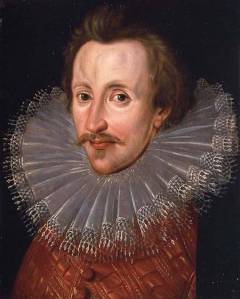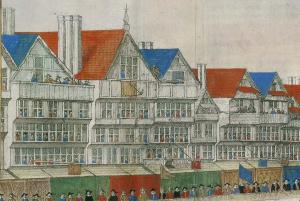
Thousands of new words entered the English language just before and just after 1600, particularly from Latin: horrid, radius, cautionary, pathetic, pungent, frugal, dislocate, submerge, antipathy, manuscript, and lexicon are a few examples. New ideas and techniques were being introduced from Europe during the Renaissance, and Latin and Greek were used as building blocks to make new vocabulary items. Words like skeleton, tendon, tibia, larynx, and sinus came to English from Greek via Latin. English was becoming a modern language. Even new words introduced recently, such as internet or quantum computation, have classical origins.

However, some people were not happy with this and The Inkhorn Controversy was the first formal dispute about the English language.

Sir John Cheke was a scholar of Greek but insisted that English was a Germanic language that should be kept pure. He even invented new Germanic words to be used instead of the new Latin and Greek ones. However, the words Cheke used himself were often Latin, Greek, or French!

The Inkhorn Controversy shows that people were becoming more confident that English did not need foreign words, but there was no way to control the language. Words entered English from many sources; some words survived and some did not. The foundations were being laid for a world language.

The first English dictionary was put together in 1604. It focussed on new, difficult words and the new ideas associated with them. The dictionary only contained about 2500 words and completely ignored ordinary everyday words. It was aimed at ordinary people; by 1600, about half of the population of England could read at least a little.

People wanted to use the new words properly, even if they could never truly control it. Queen Elizabeth I was a keen student of poetry and public speaking. The men who worked in government were expected to have these skills and many of them were poets. Poets like Sir Philip Sidney, John Donne, Edmund Spenser, and Ben Jonson created many of the expressions that we use today.

However, Shakespeare’s plays were watched by about half the entire population of London. Shakespeare mixed richly poetic and simple language so that both highly educated and ordinary people could understand.